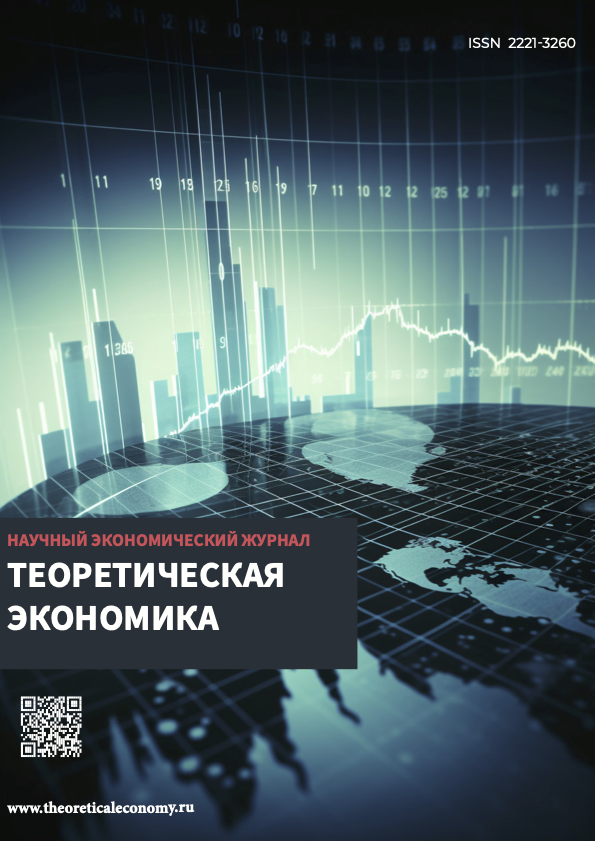Kursk, Kursk, Russian Federation
The study of the economic system of the USSR, which took shape after the building of socialism, basically showed the presence in it of various forms of labor, conditioned by the relations of ownership of the means of production. In relations of public ownership of the means of production, labor has a directly social character, although it takes two forms: concrete labor and labor in general, expressed in terms of money. Labor within the framework of the collective-farm-cooperative form of ownership has a duality, a transitional character from the private to the directly public. Labor in the remaining niches of private property relations, being private in nature, acquires the features of systematically organized labor if it is carried out on the orders of the state. The fundamental advantages of socialism in scientific and technological development are substantiated, which were gradually lost with the growth of the deformations of socialism that began in the second half of the 1950s. and consisting in the weakening of the directly social character of production and labor. The main directions of the formation of social homogeneity of labor and the destruction of classes in the course of the development of socialism are shown. The main directions of the formation of social homogeneity of labor and the destruction of classes in the course of the development of socialism are shown. The necessity of centralized planning on the basis of democratic centralism, accounting and rationing of labor, determining the measure of labor and the measure of consumption for members of society in order to achieve the goals of society and balanced development is proved. The conclusion is made about the need to move with the development of socialist society to a single form of expression of labor directly in working time. The conditions and significance of such a transition are formulated.
socialism built in the main; forms of labor under socialism, directly social labor, concrete labor, labor in general, the monetary form of labor, planning and economy of working time, the measure of labor and the measure of consumption, the formation of socially homogeneous labor.
1. Rifkin J. The Zero Marginal Cost Society: The Internet of Things, the Collaborate Commons, and the Eclipse of Capitalism. New York: St. Martins Griffin, 2015. – 448 p.
2. Homskiy N. Gosudarstvo buduschego. M.: Al'pina non fikshn. 2012. – 104 s.
3. Kallinikos A. Antikapitalisticheskiy manifest. M.: Praksis, 2005. – 192 s.
4. Shvab K. Kapitalizm vseobschego blaga: novaya model' mirovoy ekonomiki. M.: Eksmo, 2022. – 352 s.
5. Piketti T. Kapital v HHI veke. – M.: Ad Marginem Press, 2015. – 592 s.
6. Kotler F. Konec kapitalizma? 14 antidotov ot bolezney rynochnoy ekonomiki. Per s angl. – M.: Eksmo, 2016. – 288 s.
7. Vladimir Putin vystupil na Valdayskom forume. //Rossiyskaya gazeta. – Internet-resurs – URL: https://rg.ru/2021/10/21/reg-ufo/vladimir-putin-vystupil-na-valdajskom-forume.html . – Data dostupa: 21.10.21
8. Cagolov, N. A. Voprosy metodologii i sistemy politicheskoy ekonomii – M.: MGU, 1982.
9. Kurs politicheskoy ekonomii: v 2-h t./ pod red. N.A.Cagolova. M.: Ekonomizdat, 1973.
10. Hessin, N.V. Voprosy tovara i stoimosti v «Kapitale» K. Marksa. – M.: MGU, 1964.
11. Metod politicheskoy ekonomii socializma/Pod red. V. N. Cherkovca, A. A. Sergeeva//M.:Nauka1980.
12. Cherkovec, V.N. Politicheskaya ekonomiya. Principy. Problemy. Politika. – M.: MGU TEIS, 2005 – 373 s.
13. Sergeev, A.A. Dialektika razvitiya sistemy ekonomicheskih zakonov i osobennosti ih vzaimodeystviya v usloviyah razvitogo socializma. – M.:In-t ekonomiki AN SSSR, 1973.
14. Eremin, A.M. Otnosheniya socialisticheskoy sobstvennosti i ekonomicheskoe upravlenie. – M.: Ekonomika, 1973.
15. Eremin, A.M. O haraktere socialisticheskogo proizvodstva //Voprosy ekonomiki – 1974. – № 2.
16. Kosolapov, R.I. Socializm. K voprosam teorii. Moskva:Mysl'1979.
17. Voprosy dialektiki razvitiya ekonomicheskih zakonov socializma/Pod red. A.I. Kaschenko. – Yaroslavl', 1970.
18. Terent'ev, M.A. Obschestvenno neobhodimye zatraty truda i planovaya cena v socialisticheskom obschestve(Voprosy teorii i metodologii). –Voronezh:Izd-vo Voronezh. un-ta,1984.
19. Moiseenko, N.A.; Popov, M.V. Teoriya vosproizvodstva i upravlenie socialisticheskoy ekonomikoy. – M.: Mysl', 1976.
20. Zyablyuk, R.T. Potrebitel'naya stoimost' v ekonomicheskom uchenii marksizma i perestroyka hozyaystvennogo mehanizma. – M.: MGU, 1989. – 175 s.
21. Epshteyn D. Socializm XXI veka: Voprosy teorii i ocenki opyta SSSR. – M.: LENAND, 2022. – 528 S.
22. Spicyn E.Yu. Hruschevskaya slyakot'. Sovetskaya derzhava v 1953-1964 godah. – M.: Konceptual, 2020. – 592 s.
23. Marks, K. Kritika Gotskoy programmy /K. Marks, F. Engel's. Soch. 2-e izd. T. 19. S.108-112.
24. Marks K. Ekonomicheskie rukopisi 1857-1859 gg. // K. Marks, F. Engel's. Soch. 2-e izd. T.46, Ch.1. – 560 s.
25. Engel's F. Polozhenie rabochego klassa v Anglii // Marks K. i Engel's F., Soch., 2 izd., t. 2. – S.231-517.
26. Kolganov A. I., Buzgalin A. V.Reindustrializaciya kak nostal'giya? Teoreticheskiy diskurs // Sociologicheskie issledovaniya. 2014. № 1. S. 80-94
27. Shvab K. Chetvertaya promyshlennaya reolyuciya. – M.: Eksmo, 2020. – 288 s.
28. Marks K. Ekonomicheskie rukopisi 1857-1859 gg. //K. Marks i Engel's F., Soch., 2 izd., t. 46, ch. II. – 619 s.
29. Bodrunov S.D. Noonomika. – M.: Kul'turnaya revolyuciya, 2018. – 432 s/
30. Lenin V.I. Ekonomika i politika v epohu diktatury proletariata //V.I. Lenin. Poln. sobr. soch., T.39. – S.273-282.
31. Marks K. Kapital. T.3. // K. Marks i Engel's F., Soch., 2 izd., T. 25. – 1084 s.
32. Moiseenko N.A., Popov M.V. Demokraticheskiy centralizm - osnovnoy princip upravleniya socialisticheskoy ekonomikoy. – Leningrad: Lenizdat, 1975. – 174 s.
33. Lenin V.I. O znachenii zolota teper' i posle polnoy pobedy socializma //V.I. Lenin. Poln. sobr. soch., T.44. – S.221-229.
 This work is licensed under Creative Commons Attribution-NonCommercial-NoDerivatives 4.0 International
This work is licensed under Creative Commons Attribution-NonCommercial-NoDerivatives 4.0 International











